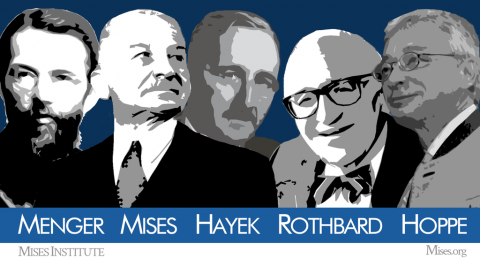Andrew Coyne points out that the study of economics probably disqualifies you from being an effective politician, because achieving success in the sausage factory of politics requires you to ignore or even work against economic facts:

A Mises Institute graphic of some of the key economists in the Austrian tradition (Carl Menger, Ludwig von Mises, Friedrich Hayek, Murray Rothbard, and Hans-Hermann Hoppe.
Mises Institute via Wikimedia Commons.
I believe I was the first to propose the creation of an Economists Party, a political movement that would advocate for the sorts of policies favoured by people who study economics for a living, based on the principles at its core.
It could not happen, of course, any more than the existing parties are likely to suddenly embrace the teachings of economists they have so cheerfully ignored until now, and for the same reason: because politics is, at its core, the opposite of economics.
The basic principle of economics is that everything is scarce. The basic principle of politics is that nothing is scarce. Economics teaches that more of one thing can only be had at the expense of less of another. Politics teaches that we can have more of both things, and of everything else besides.
Since more of one thing means less of another, economics tells us there is no point in favouring one part of the economy over another: the resources diverted to one firm, industry or region are simply resources denied to all the rest. Whereas politics is all about such transfers: a perpetual merry-go-round of redistribution, not from rich to poor, which is appropriate, but from everybody to everybody, which is impossible.
And if, for some reason, a politician were to resist this impulse, he would shortly find himself out of work. For whereas the benefits of a given intervention are typically concentrated on this or that group, the costs are spread widely; its beneficiaries, accordingly, have every incentive to organize and agitate on its behalf, while those footing the bill — consumers, taxpayers, or both — have comparatively little at stake as individuals. They may not even know who they are.
Thus it is that politics inclines, more or less inevitably, to prefer the narrow interest over the broad; producers over consumers; the present over the future. The only difference between the parties is whether this bias to the expedient is dressed up as a philosophy and celebrated as a positive good, or merely yielded to.




It why the Libertarian Party is so ineffective. Even Ron Paul did better as a Republican. The highly erroneous notion that people can know what is in the majorites best interest pretty much derails the concept of the nation-state. That’s why they all eventually crash and burn and seldom do what do what is in the majorities best interest. It was governments that legalized slavery and other forms of involuntary servitude and it was the Citizens that finally forced them to stop it or it would still exist in mass.
People just don’t want to believe that government is created by the monied class to tax the majority so they can redistribute it to their special interests and they will never provide campaign financing to anyone who wants to deter their efforts. The democratic republic has long ago been proven to be a deleterious institution and the uneducated and nefarious will always vote themselves benefits at the expense of others if given a chance.
Comment by Harry Robinson — September 20, 2019 @ 13:41